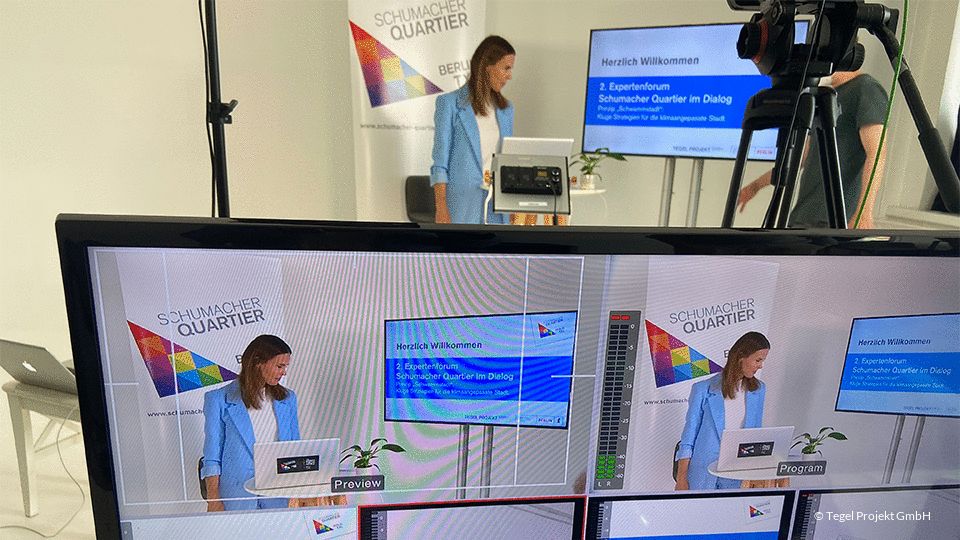On Monday, 09.08.2021, the second specialist event in the series “Schumacher Quartier im Dialog” took place as a digital conference. Under the motto “Principle “Sponge City” – Smart Strategies for the Climate-Adapted City”, interested participants exchanged ideas with experts on a topic that has gained additional explosiveness due to the flood disaster in North Rhine-Westphalia and Rhineland-Palatinate in July 2021: How can cities deal with extreme weather events in the future, which increasingly influence how people live and reside?
The kick-off was given by the management of Tegel Projekt GmbH, Gudrun Sack and Prof. Dr. Philipp Bouteiller, who presented the principle of the sponge city in the Schumacher Quartier in their welcome address and a first impulse lecture. The Schumacher Quartier is to become the largest “sponge city quarter” in the world – so far unique in concentration and consistency. In light of current events, Prof. Dr. Philipp Bouteiller stated, “We have always said from the beginning that when we develop city, we have to stop working against nature, we have to work with nature.” Gudrun Sack added to this the question of what water-sensitive neighbourhood development could look like and presented important principles of the Schumacher neighbourhood, including roofs with retention and evaporation functions, swale infiltration and evaporation surfaces. Jürgen Weidinger from Weidinger Landschaftsarchitekten then reported on the landscape planning in Berlin TXL and the challenges that arise in planting and implementation in Berlin TXL. He emphasised that good management and care in the dense urban space are absolutely necessary in order to maintain projects in the long term.
In the interview with Dr Darla Nickel from the Berlin Rainwater Agency, the potential, added value and success factors of decentralised rainwater management in Berlin were discussed in concrete terms. Dr. Nickel positively emphasised that Berlin is already quite far ahead in smart strategies, especially in new construction. There are good framework conditions for implementing sustainable rainwater management and the topic plays an important role in almost all major construction projects. Dr. Cornelia Peters from the Hamburg Ministry for the Environment, Climate, Energy and Agriculture reported on successful green roofs and façades. Her core message: one has to rely on different programmes and ideas in order to implement projects successfully. Hamburg follows the guiding ideas: Support, dialogue, demand and accompany. In the following discussion, the ideas and concepts were discussed in a lively exchange with all the experts, with the participation of the audience.
Here you can find a complete documentation of the event in video.
Keynote speeches | Prof. Dr. Philipp Bouteiller and Gudrun Sack (Management, Tegel Projekt GmbH). Click here for the video.
What is planned and what are the challenges for landscape planning, planting and implementation in Berlin TXL? | Prof. Jürgen Weidinger (Weidinger Landscape Architects, Berlin). Click here for the video.
Five questions to… Interview about potential, added value and success factors of decentralised rainwater management in Berlin | Dr. Darla Nickel (Berliner Regenwasseragentur). Click here for the video.
How can good roof and façade greening succeed? – Best Practises | Dr. Cornelia Peters (Ministry for the Environment, Climate, Energy and Agriculture, Hamburg). Click here for the video.
